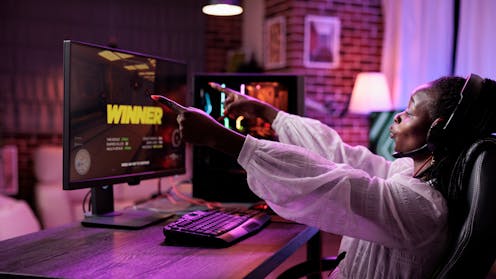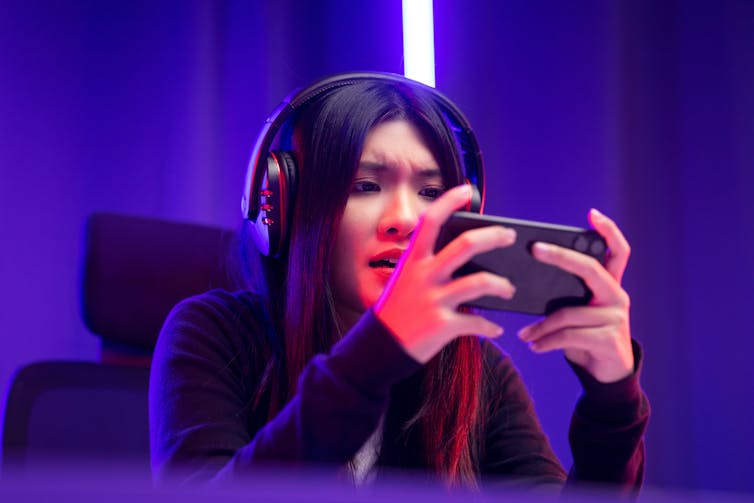
While playing video games has traditionally been thought of as a male-dominated pastime, 51% of women now game in some capacity compared to 53% of men. However, although the number of women playing video games continues to increase, their representation varies across different genres, platforms and games.
We surveyed 1,000 women of all ages across the UK who play mobile games (the most popular way for women to play).Our analysis, published in the journal Sex Roles, found that despite being an important part of their lives, many female gamers experience negative emotions in relation to games.
Twenty-nine per cent felt guilty for taking time to play video games, and 16% keep gaming a secret for fear of judgment.
More than 41% of the women we surveyed agreed that playing games is one of the things they most look forward to each day. However, almost 60% felt that they do not play enough games to consider themselves a “gamer” and more than 30% said they would be embarrassed to call themselves one. Women who look forward to playing were more likely to feel guilty than those who do not.
While 75% of participants classified themselves as “casual gamers”, nearly 25% of them were not only playing mobile games, but also spending more than an hour a day playing games on PC or console. Strikingly, even among women who spent more than five hours a day playing games, only 16% identified as a “hardcore gamer”.
Our results suggest that many women feel excluded from video game culture. But while we expected that feelings like guilt would reduce the amount of time women spent playing games, we didn’t find such a connection. Those who feel guilty or keep their gaming a secret don’t play less – but they feel worse. This surprised us, and led us to dig further into the data.

We found that younger players are particularly guilt prone. Women aged 16-24 were three times more likely to feel guilt than those older than 54. While many people feel guilty about indulging in hobbies, women often get less leisure time than men and feel pressure to spend their leisure time doing productive tasks.
But that’s not the only barrier. Women were twice as likely to feel guilty if they didn’t know which games to try or if they thought games were too violent. This finding aligns with previous research that found that one of the main barriers to gaming for women is a lack of awareness of the diversity of available games available – not least because there is a limited range marketed to women.
Finally, guilt seemed to be related to whether women felt they fit into gaming culture. Women were twice as likely to feel guilty if they also thought that gaming was mainly a male pastime, or if they said they would be embarrassed to call themselves a gamer. In contrast, women who felt that occasionally playing any game made you a gamer were 42% less likely to feel guilty.
We found that 16% of participants keep their gaming a secret for fear of judgment. Women who reported feeling anxious or depressed when scrolling social media were more than twice as likely to do so compared to women who did not.
Feeling and expressing pride in gaming as a woman is a difficult balancing act. Women who felt very proud of their achievements in games were slightly more likely to keep it a secret than those who did not feel as proud. In contrast, women who were motivated to play games to challenge themselves were half as likely to keep it a secret.
Removing barriers to play
Our findings suggest that many women feel games and gaming culture are not intended for or open to them. Women spend less time playing if they believe that gaming is a male pastime, or that they don’t play enough games to be a gamer, are embarrassed to call themselves a gamer, or think video games are too violent.
We think that guilt and keeping secrets are just symptoms. While they are clearly negatively affecting female gamers, they don’t seem to be the root of the problem.
There’s more work to do. This study focused on participants who identify as women, and there are probably other barriers to play facing people of other gender identities. Understanding these barriers and how they interrelate is important for overcoming them, to increase the quantity and quality of gaming experiences in general.
Removing barriers to play will require deeper structural changes, such as reducing leisure inequality. But people in the games industry and gaming culture can also help by broadening the perception of who plays video games, who games are for, and what types of games are available. Given that pride is associated with more time playing, it would also benefit both the games industry and players to normalise the celebration of gaming achievements for women. You can help too. If you play games, why not recommend one to a friend?
Looking for something good? Cut through the noise with a carefully curated selection of the latest releases, live events and exhibitions, straight to your inbox every fortnight, on Fridays. Sign up here.
Stephanie Rennick conducted this research in collaboration with Unity consulting and Undone Games.
Seán Roberts conducted this research in collaboration with Unity consulting and Undone Games.
This article was originally published on The Conversation. Read the original article.







